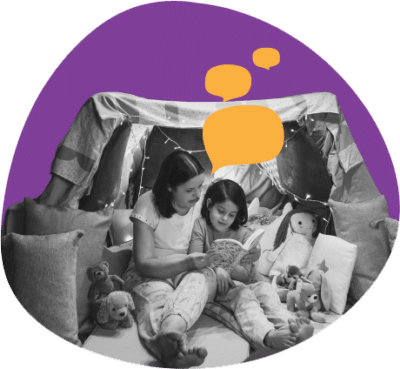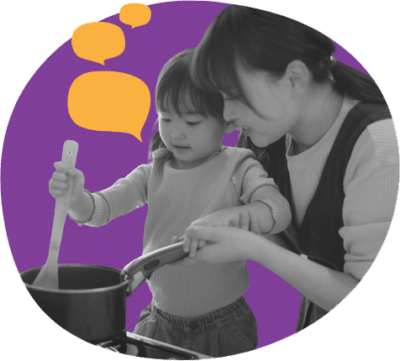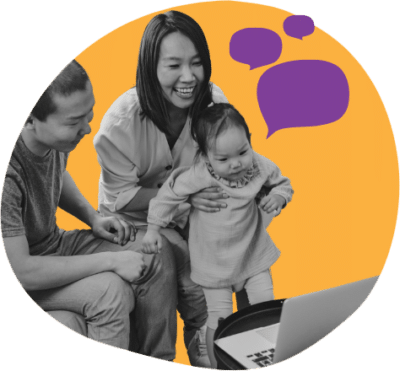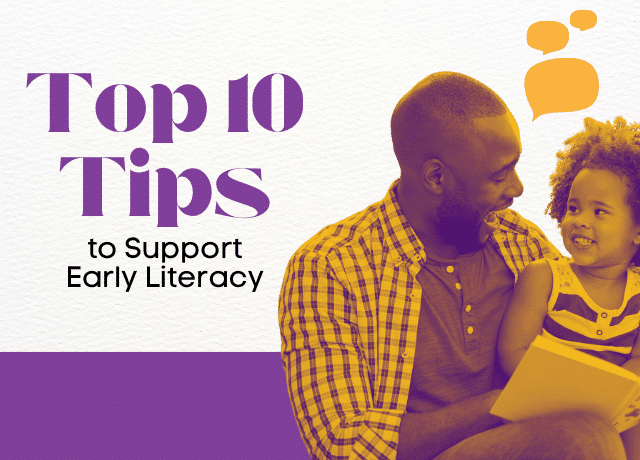Reading, writing, and language skills don’t start in kindergarten — they begin the moment a child enters the world. Every bedtime story builds early literacy skills. So does a game of peekaboo. Even scribbled drawings. Whether in early childhood education environments or at home, these foundational experiences create natural stepping stones toward future reading and writing success.
Think of early literacy skills as a child’s growing collection of tools for making sense of words and stories. Long before they read their first book or write their first letters, children develop crucial pre-reading abilities through everyday moments. Simple activities are powerful building blocks for literacy.
Whether you’re a caregiver or educator, you already have everything you need to nurture these important skills. The key is knowing which everyday moments matter most and how to make the most of them.
Understanding Early Literacy Development
Just like walking and talking, literacy skills develop step by step. Children build their reading and writing foundation through six key skills:
- Understanding how books work
- Recognizing that letters make specific sounds
- Building vocabulary
- Playing with the sounds in words
- Learning letter names and shapes
- Telling stories
You might notice a baby turning pages in a board book, a toddler trying out new sounds, or a preschooler “writing” a story. This is early literacy in action! When children explore these skills naturally through play and daily activities, they develop a genuine love of reading that lasts a lifetime.
And good news! You must practice, and you must be intentional. But you DO know how to support these skills!
10 Proven Tips to Boost Early Literacy Skills
1.Make Every Conversation Count
Turn everyday chats into brain-building moments! When children say something, respond. When they point, describe what they’re showing you. Sounds simple, 
Don’t just talk to children. Talk with them. Conversational turns strengthen the brain connections that support reading, literacy, and social skills. Even with babies, respond to their coos and babbles as if they’re telling you fascinating stories. The magic number? Try for 40 of these back-and-forth exchanges each hour. Like during meals, at the playground, or while you’re sharing a book.
2. Create a Language-Rich Environment
Transform your space into a world of words! Place books at children’s eye level next to their favorite toys. Make sure they’re easily accessible to them. Label everyday items with simple words and pictures. Turn your refrigerator into an alphabet museum with magnetic letters. Create a cozy reading nook with pillows and a basket of books. Remember, when children see words as part of their everyday world, they naturally develop curiosity about reading.
3. Embrace Interactive Reading
Make story time an adventure! Instead of racing through books, take your time. Ask questions about the pictures. Let the child turn the pages. Follow their interests. When they point to something, expand on it: “Yes, that’s a red truck! Where do you think it’s going?” Ask open-ended questions that encourage conversation.
This kind of back-and-forth reading builds vocabulary and foundational skills that can lead to successful reading comprehension in later years. Don’t worry if you read the same book repeatedly. And don’t worry if you don’t read all the pages. Each reading builds different skills and deeper understanding.
4. Turn Daily Routines into Early Literacy Moments
Sneak learning into everyday tasks! Read box labels together. While doing laundry, sort socks by color and count them. At bath time, write letters in shaving cream on the wall. Sing songs together on car rides. These simple additions to your regular routines build vocabulary and print awareness without feeling like “teaching.” Even grocery shopping becomes an early literacy adventure when you hunt for letters on food packages together. 
5. Use Music and Movement
Get those bodies moving and brains growing! Sing songs with hand motions, dance to nursery rhymes, and play musical games. When children move their bodies while learning letter sounds or new words, they remember them better. Try adding silly actions or make up movements to go with a favorite story like “Going on a Bear Hunt” or “People on the Bus.” Play games like “Head, Shoulders, Knees, and Toes” to connect words with body parts, or create simple songs about daily activities like nap time.
6. Foster Writing Development
Encourage all forms of early writing! Celebrate scribbles, random marks, and letter-like shapes. They’re all-important steps toward writing and early literacy development. Create opportunities for “real” writing by having children help sign cards, make shopping lists, or label their artwork.
7. Build Vocabulary Through Play
Turn playtime into word-learning time! During pretend play, introduce new words naturally. If a child is pretending to cook, teach words like “menu,” “recipe,” and “ingredients.” When they’re playing with blocks, use words like “tower,” “bridge,” and “architect.” Remember, the more words children hear in meaningful contexts, the better prepared they’ll be for reading.
8. Support Sound Awareness
Have fun with sounds! Clap out syllables in names. Make up silly rhymes and play I-spy with beginning sounds. Help children notice that “cat” and “hat” rhyme, or that “snake” and “soap” start with the same sound. These playful sound games build crucial pre-reading and early literacy skills.
9. Make Technology Work for Early Literacy
Choose digital tools wisely! Record children telling stories, then play them back. If you’re a caregiver, use video calls with family to practice conversation skills. Technology is an excellent supplement, not replacement, for face-to-face interactions. Take photos of words in your environment during walks and review them together later. Create digital stories with children using simple photo apps and their own narration. 
10. Create Consistent Early Literacy Routines
Build reading and writing into your daily schedule! Set aside regular times for stories, whether it’s before nap, after lunch, or at bedtime. Create special places for reading and writing activities. Make these literacy moments regular and enjoyable so children look forward to them as highlights of their day. Keep favorite books in different rooms to create multiple opportunities for reading throughout the day.
Building Early Literacy Skills: Your Next Steps
Supporting a child’s early literacy development requires attention, creativity, and consistency. Each song you sing, story you share, and conversation you have plants seeds for future reading success. Best of all, these simple moments create lasting bonds between you and your child while building crucial skills for their future.
The science says it all. Early interactions shape children’s brain development in powerful ways. When families and educators work together to create language-rich environments, children develop stronger vocabulary, better reading comprehension, and greater confidence in their learning abilities. These skills carry forward not just into kindergarten, but throughout their academic journey.
Need more early literacy support? Explore our free resources for families and educators at LENA.org, where you’ll find research-based activities, printable guides, and additional tips for supporting early literacy development. Together, we can help every child discover the joy and power of reading.
[callout]



